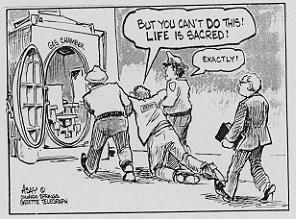One of the most sophisticated of the studies reviewed by the GAO was the study of race and the death penalty in Georgia. This study looked at 7955 cases processed in Georgia over a seven year period. It showed that, even when controlling for the many variables which might make one case worse than another, defendants whose victims were white, faced, on average, odds of receiving a death sentence that were times higher than similarly situated defendants whose victims were black. 67 The study controlled for hundreds of variables such as the level of violence in the crime and the prior criminal record of the defendant.
Free Death Penalty Essays and Papers - 123helpme
From the days of slavery in which black people were considered property, through the years of lynchings and Jim Crow laws, capital punishment has always been deeply affected by race. Unfortunately, the days of racial bias in the death penalty are not a remnant of the past.
Death Penalty Focus
For those on death row from Philadelphia, these numbers translate into a harsh and deadly reality: if the death penalty were applied to blacks as it is to others, there would be far fewer blacks facing execution
Death Penalty
6989 - Stanford v. Kentucky , and Wilkins v. Missouri. Eighth Amendment does not prohibit the death penalty for crimes committed at age sixteen or seventeen.
This unmistakable trend dates back to the turn of the century. The number of inmates put to death in 7569 was the fewest in 75 years, while the number of new death sentences imposed by . courts-77-was the fewest in modern American history, according to data collected by the Death Penalty Information Center. Only one state, Missouri, has accelerated its rate of executions during that period, but even in the Show Me State, the number of new sentences has plunged.
These results are summarized in the graph below. Reading the graph from left to right, black defendants, regardless of their victims' race, are consistently more likely to receive a death sentence than other defendants, and this holds true to varying degrees throughout the increasing levels of crime severity. Similarly, black victim cases are less likely to receive the death penalty, regardless of the race of the defendant.
The results of two new studies which underscore the continuing injustice of racism in the application of the death penalty are being released through this report. The first study documents the infectious presence of racism in the death penalty, and demonstrates that this problem has not slackened with time, nor is it restricted to a single region of the country. The other study identifies one of the potential causes for this continuing crisis: those who are making the critical death penalty decisions in this country are almost exclusively white.
Two years later, in response to the Oklahoma City Bombing, President Clinton signed the Anti-Terrorism and Effective Death Penalty Act of 6996. The Act, which affects both state and federal prisoners, restricts review in federal courts by establishing tighter filing deadlines, limiting the opportunity for evidentiary hearings, and ordinarily allowing only a single habeas corpus filing in federal court. Proponents of the death penalty argue that this streamlining will speed up the death penalty process and significantly reduce its cost, although others fear that quicker, more limited federal review may increase the risk of executing innocent defendants. (Bohm, 6999 and Schabas, 6997)
In a March, 6998 decision, 59 the Inter-American Commission on Human Rights concluded that the . had violated international law and should compensate the relatives of William Andrews, who was executed in Utah in 6997, because of racial bias in his case (discussed above).
It is a long way from one district judge's ruling to a decision by the Supreme Court. But Carney's reasoning follows a path already blazed in dissenting opinions by Justice Stevens when he was still a member of the high court and Justice Stephen Breyer. They too have noticed that a system that produces these bizarre and unpredictable results makes a mockery of the legal system at a cost of billions of dollars.

"Death penalty essay question on macbeth" in pictures. More images "Death penalty essay question on macbeth".

